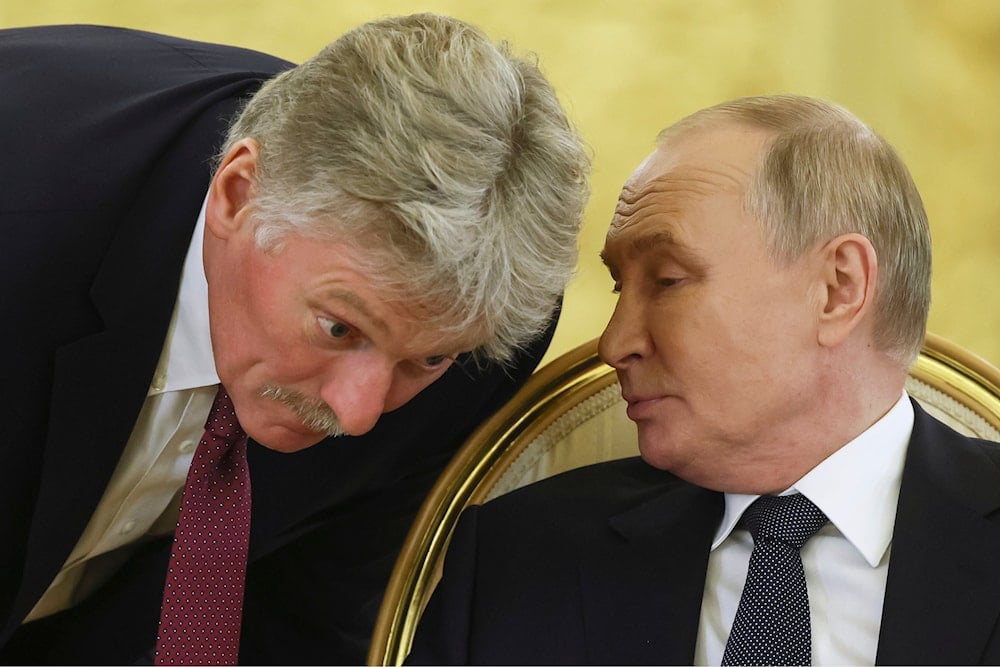Russia's nuclear doctrine update signals message to West: Kremlin
Kremlin spokesperson Dmitry Peskov stresses that Russia's nuclear doctrine is not a coincidence but a clear message to the West.
-

Russian President Vladimir Putin, right, speaks with Kremlin spokesperson Dmitry Peskov during an extended meeting at the summit of the heads of state of the Commonwealth of Independent States (CIS) at the Kremlin in Moscow, Russia, October 8, 2024. (AP)
Kremlin spokesperson Dmitry Peskov told Russian journalist Pavel Zarubin in an interview published Sunday that President Vladimir Putin's decree updating Russia's nuclear doctrine should be viewed as a message to the West and not as a mere coincidence.
“Surely, there cannot be any coincidences here. There is certain consistency,” Peskov said when asked about the doctrine update, adding that Russia is ready to respond to unprecedented escalation incited by the West.
“Although President Putin assigned to prepare the amendments in order to adapt our [nuclear] doctrine to the conditions of the current confrontation, which is incited by the Western states, Putin has to respond to the unprecedented escalation which is primarily spurred by the outgoing administration in Washington,” Peskov said.
The spokesperson added that the United States is taking increasingly reckless actions to escalate the conflict in Ukraine.
Regarding the Oreshnik missile test-fire this week, Peskov said, “Apparently, a very narrow circle [of people knew about it]."
Peskov admitted he was unaware of the test and noted that, given the current geopolitical situation, the development of new weapons is a highly classified process.
Oreshnik hypersonic ballistic missile system
Two days ago, during a meeting with top military officials and military industry executives in the Kremlin on Friday, Russian President Vladimir Putin commented on the new Oreshnik hypersonic ballistic missile system.
Oreshnik is Russia's newest hypersonic intermediate-range ballistic missile (IRBM), which Putin unveiled Thursday. Russia targeted the Yuzhmash complex in Dnipro, Ukraine, which manufactures missile technology, with a successful Oreshnik strike.
Russia already possesses a stockpile of Oreshnik missile systems and has decided to mass produce them, Putin divulged.
The pPresident explained that Russia would "continue these tests, including in combat conditions, depending on the situation and the nature of the security threats that are created for Russia, especially since we already have a stockpile of such systems ready for use."
Putin approves Russia's updated framework
On November 19, Putin approved the framework for Russia's state policy on nuclear deterrence, as outlined in a decree published on the legal information portal.
The timing of the issuance of the decree is critical as it comes mere days after US President Joe Biden approved Ukraine's use of American long-range missiles against military targets within Russia, in a significant policy shift long sought by Kiev.
Putin has warned that such a decision would signify NATO's direct involvement in the conflict.
The decree emphasizes enhancing Russia's nuclear deterrence strategy to address potential threats and maintain national security.
It categorizes aggression against Russia or its allies by a non-nuclear state supported by a nuclear one as a joint attack, adding that any aggression from a state within a military coalition is treated as an act of aggression by the entire coalition.

 3 Min Read
3 Min Read









